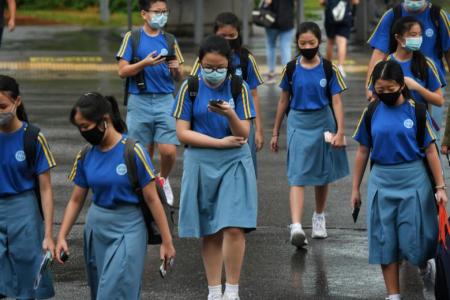New programme to educate secondary school students on safe cyber habits in the works
About 100,000 students will be taught safe cyber habits via an upcoming programme to be implemented in secondary schools here.
Titled the Surf Safe Campaign, the programme is a collaboration between cyber protection firm Acronis and non-profit organisation Cyber Youth Singapore.
A memorandum of understanding to develop the programme was signed by representatives from both organisations on Monday (Jan 17).
The programme is slated to run for three years and engage about 50,000 students within the first two years.
It aims to educate the students on issues such as the importance of surfing the internet safely, having a strong password and cyber bullying.
The programme will be implemented in schools by Cyber Youth Singapore, and will be tailored for each school, to suit its needs and learning objectives.
The Safe Surf Campaign is supported by the Digital for Life movement, which aims to equip Singaporeans with digital skills and help bridge the digital divide.
The national movement's fund - to support activities that promote good digital habits such as in the areas of cyber safety and media literacy - was set up by the Infocomm Media Development Authority in February last year.
Mr Xavier Low, chief executive of Cyber Youth Academy, a division of Cyber Youth Singapore, said on Monday that the Surf Safe Campaign will be implemented in schools starting between late February and early March.
Besides talks, the programme will consist of activities and games for students available at booths in the schools.
Mr Low said volunteers - mainly from the polytechnics - will also be engaging students to determine whether there are gaps in their understanding of the content taught.
"We will be able to identify the flaws (in the programme), make the changes, and come back next year…to better increase the level of engagement and understanding(with students)," he added.
Mr Low said the programme might be extended after its third year, and cover other vulnerable groups in the community such as the elderly and lower-income families.
More children here faced cyber risks in 2020 than 2019, according to a study released in February last year by tech giant Google.
A higher percentage of parents surveyed here said their child had viewed inappropriate content, overshared information on social media, or faced hacking or cyber bullying, as compared to the year before.
Scams have also made headlines recently, with nearly 470 people losing at least $8.5 million to phishing scams involving OCBC Bank since the start of December.
The bank had said about $2.7 million of the amount was lost over the Christmas weekend.
Get The New Paper on your phone with the free TNP app. Download from the Apple App Store or Google Play Store now


